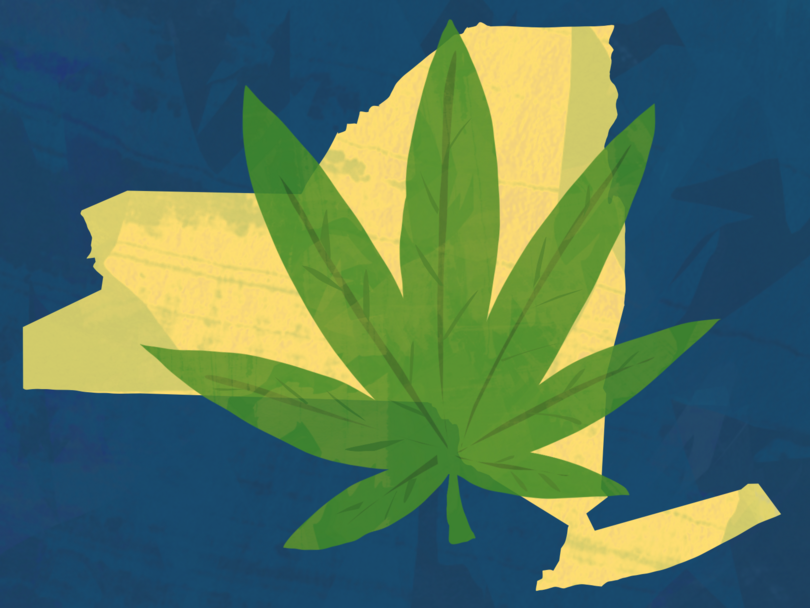Explaining New York state’s progress on cannabis legalization

Since the 2021 state-wide legalization of recreational cannabis usage, New York has continued with restrictive cannabis policy. Gov. Kathy Hochul has taken a firm stance on the disbanding of illegal cannabis operations. Flynn Ledoux | Illustration Editor
Get the latest Syracuse news delivered right to your inbox.
Subscribe to our newsletter here.
As New York state celebrated its fifth 4/20 since legalizing cannabis, the recreational drug remains illegal to possess on college campuses under federal law. At Syracuse University, the use of cannabis, including for medicinal purposes, is prohibited.
While illegal on campuses, the state cannabis industry has skyrocketed since legalization in March 2021, with the industry generating over $1 billion in revenue in 2024, according to ABC News10. As of Oct. 2024, 10 dispensaries were licensed to operate in Onondaga County, according to syracuse.com,
On SU’s doorstep, Marshall Street’s cannabis landscape shifted recently with a new Dazed location’s opening Monday. The New York-licensed cannabis dispensary’s owners, along with Syracuse basketball legend Carmelo Anthony, hosted a meet-and-greet as the recent Hall of Fame inductee promoted his StayMe7o cannabis products.
Dazed joins other local licensed dispensaries like FlynnStoned’s cannabis showcase, which opened above J. Michael Shoes on Marshall Street in 2023. Both businesses have emphasized safety and education in their business models as a legal operation in close proximity to the university.
While generating new revenue for business owners and the state, this surge in new cannabis businesses has come with some complications.
As part of New York Gov. Kathy Hochul’s annual executive budget proposal in January, she called for the smell of cannabis to trigger probable cause for law enforcement to order drug tests and searches. The proposal would alter the Marihuana Regulation & Taxation Act, which currently prohibits using odor or the presence of cannabis to determine probable cause of a crime.
The state’s Office of Cannabis Management has opposed the proposal, citing law enforcement’s seizures, car searches and use of force justified on the basis of smell during the war on drugs. These incidents disproportionately resulted in incarceration of people of color, Spectrum Local News reported.
The OCM also recently announced its “Higher Education” campaign on April 17, which aims to empower adults over 21 to make informed decisions about cannabis. QR codes linking to the OCM’s online educational library will be placed in public spaces across the state, including dispensaries, high-traffic areas and transit hubs to educate people about cannabis consumption and safety.

Cole Ross | Digital Design Editor
As state policy makers are in the process of adding exceptions to regulations limiting the number of cannabis businesses in a set area, many dispensary owners are concerned about overcompetition with new businesses entering the scene.
In January, four licensed cannabis shops in New York City sued the state over its proximity rules. The lawsuit claims state regulators violated their own “1,000-foot” buffer zone rules between dispensaries by granting waivers to competitors to operate closer than allowed.
These buffer zones were originally intended to prevent too many dispensaries from populating heavily in one area, potentially causing oversaturation. The plantiffs claim the state’s Cannabis Control Board and OCM allowed new dispensaries to open less than 1,000 feet from existing businesses under special waivers.
While no changes have been approved yet, the state is considering revisions to its proximity rules and adding similar waivers in cases where buffer zones are deemed unnecessary — most commonly in areas where there is high demand for cannabis products. A proposed revision to New York’s Cannabis Law from April 2 claims many business owners are not made aware their property is within a buffer zone until they’ve already purchased it.
Under the proposed revision, waivers would be administered for “public convenience and advantage” to make cannabis business locations more available. In cases where the new dispensary would create unfair competition to existing businesses, the CCB will deny waivers.
Throughout these discussions, Hochul has remained firm in her stance to deter illegal cannabis production and consumption. In 2023, she proposed measures including potential fines of up to $200,000 for businesses possessing illicit cannabis products and $10,000 per day for those operating without proper licensing.
In the same year, two dispensaries on Marshall Street, NY Exotic and EXscape Exotic, were shut down for violating laws prohibiting illegal cannabis sales, syracuse.com reported. The OCM is also investigating several cannabis companies throughout New York for selling cannabis from unauthorized sources in dispensaries, according to The New York Times.
Amid debate over meritable cannabis production and consumption, a 2023 study of roughly 14,000 college students, published in the Addictive Behaviors journal, found that nearly 40% of college students use cannabis products.





